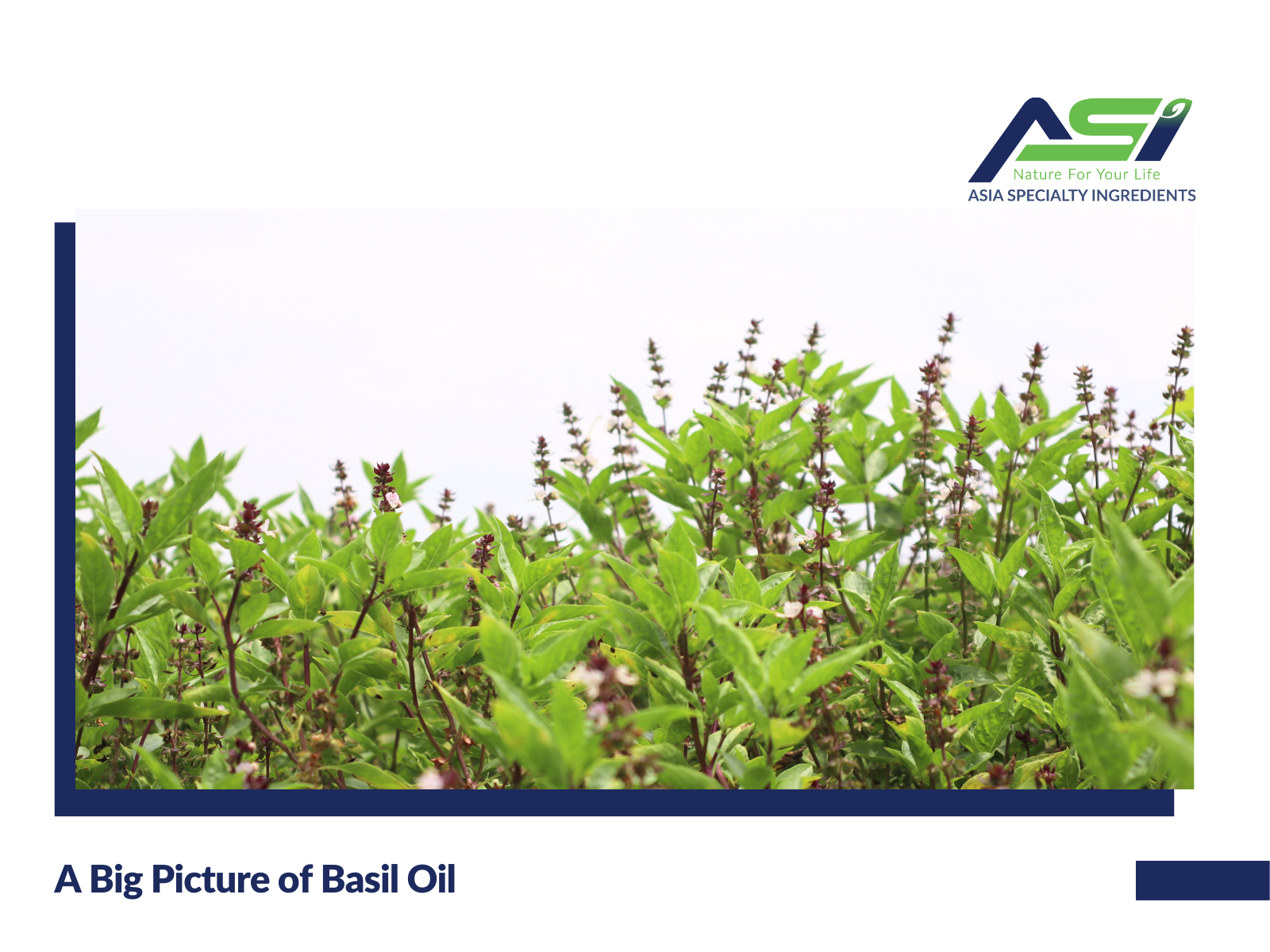Basil oil (basilicum oil), derived from the leaves of the basil plant (Ocimum basilicum), is a versatile and aromatic oil renowned for its wide-ranging applications in health, wellness, and culinary arts. Known for its rich, spicy aroma and potent therapeutic properties, basilicum oil has been a staple in traditional medicine for centuries. This article offers a glimpse into the overview of this remarkable natural extract, highlighting its significance in both ancient practices and modern-day applications.
Table of Content
ToggleA brief definition of basil oil
Basil oil is essential oil extracted from the leaves of basil, also known by its botanical name Ocimum basilicum. Basil is cultivated widely in Asia, Africa, South America, and the Mediterranean. The essential oils and aromatic extracts from Ocimum varietiesare also important components of dental products, pharmaceuticals, cosmetics, and flavoring agents. In Other countries where basil oil is commonly included in food are Indonesian cuisine, Vietnamese Cuisine, and Thai Cuisine.
Multifaceted applications of basil oil
Basil (Ocimum basilicum) is one of the most popular and healthy culinary herbs in the world. Essential oil derived from basil (basil oil) through steam distillation has traditionally been used for a wide range of applications such as cooking spices, aromatherapy, perfumery, medicinal treatments, pesticides, and food preservatives. This part is focused on applications of basil oil in food science, especially in food flavoring, preservation, and production.
Aromatherapy: basil herb oil in massage therapy to help relax the muscles, relieve tension, and improve circulation. It’s also effective in relieving pain and soreness caused by physical activity or injury
Culinary Flavoring: Basil is one of the most popular culinary herbs. Due to its pleasant fragrance, basil oil is an additive in many foodstuffs. Basil oil has been used in sausages and other meat products. Basil oil is also an additive in alcoholic and nonalcoholic beverages. In addition, basilicum oil is widely used in combination with other spices and herbs in confectionary products, sweets, bakery products, puddings, condiments, vinegars, ice creams, and mustard.
Medicinal treatments: When used medicinally, basilicum oil is reputed to ease minor skin irritations, cramps, joint pain, muscular aches, spasms, gout, flatulence, and exhaustion. It is also said to enhance immune function, protect against infection, reduce water retention, and stabilize irregular menstruation.
Cosmetic: Massaging the skin with basil oil helps to rejuvenate and bring a glow to the skin. It not just brings a glow into the skin, but also treats acne and other skin related issues. Sometimes basil oil is also used for purifying blood toxin, treating acne, lightening the skin tone and treating skin diseases.
Perfumery: Basil is used for its strong, fresh, and slightly sweet aroma. It is a popular ingredient in perfumery, particularly in colognes, eau de colognes, and other fresh, crisp, and invigorating fragrances. It also can be used to add a unique and distinctive note to floral, herbal, and green perfumes
Read more: Basil Oil in the Cosmetic and Perfume Industry
Side effects and cautions when using basil oil
Basil is like safe when consumed in food amounts. When taken by mouth as a medicine, basil is possibly unsafe. The main component of basil oil is estragole. It is a chemical that might increase the risk of getting liver cancer.
In addition, basil leaves contain a high amount of vitamin K, which could interfere with blood-thinning drugs. Please kindly speak with a doctor so they can provide advice based on your specific circumstances
When basil oil is very high concentrated, which means it may cause irritation if applied to the skin.
Reminds
Bleeding disorders: Basil oils and extracts might slow blood clotting and increase the risk of bleeding in people with bleeding disorders.
Low blood pressure: Basil extracts might lower blood pressure. In theory, taking basil extracts might make blood pressure become too low in people with low blood pressure.
Surgery: Basilicum oil and extracts might slow blood clotting. In theory, basil oils or extracts might increase the risk of bleeding during surgical procedures. Stop using basil at least 2 weeks before a scheduled surgery.
Conclusion
In conclusion, basilicum oil stands out as a multifaceted essential oil with a rich history and a broad spectrum of uses. Its therapeutic properties, ranging from stress relief and mood enhancement to antimicrobial and anti-inflammatory benefits, make it a valuable addition to both traditional and contemporary health practices. As we continue to explore and appreciate the full potential of this remarkable oil, its role in promoting holistic wellness and enhancing daily life remains undeniably significant.
Asia Specialty Ingredients (ASI), part of Asia Ingredients Group (AIG), specializes in the production and global export of essential oils and natural aromatics. Our range of products is meticulously processed using only the finest natural ingredients sourced from the typical lands of Vietnam, including Cassia, Basil, Star Anise, and more, ensuring good product quality. Contact us for more collaboration opportunity!








